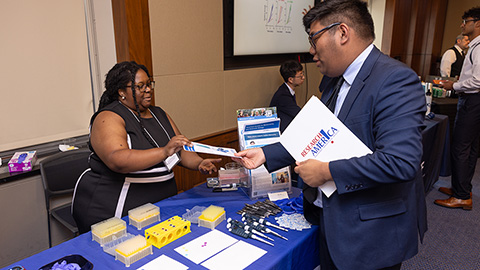Bill would reform NSF and plant innovation hubs nationwide
The Endless Frontier Act, introduced in both the House and the Senate at the end of May, would transform the United States' national strategy for investing in science and technology. It also would fix the uneven distribution of innovation jobs across the country, which has concentrated investment and resulting wealth in a handful of cities.
On May 28, Sen. Chuck Schumer, D-N.Y., Sen. Todd Young, R-Ind., Rep. Ro Khanna, D-Calif., and Rep. Mike Gallagher, R-Wisc., unveiled the bipartisan, bicameral Endless Frontier Act to reform (and rename) the National Science Foundation, establish a regional technology hub program, and require a strategy and report on economic security, science, research and innovation. This legislation also would authorize Congress to pump up to $100 billion into the agency over five years if it so chooses.
The bill emphasizes that the federal government must address the uneven geographical distribution of innovation jobs, saying: “More than 90 percent of the nation’s innovation sector employment growth in the last 15 years was generated in just 5 major cities.”
According to a report in December by the Brookings Institution, those five major cities — Boston, San Francisco, San Jose, Seattle and San Diego — are well established as innovation hubs and continue to attract skilled workers and capital at the expense of other regions of the country.
The act would establish, with $10 billion from the Department of Commerce, 10 to 15 regional hubs that would serve as large-scale, platform labs for innovation. This would change the job market for many Americans, redistribute skilled workers and spread the positive economic impact of innovation.
If the legislation becomes law, the NSF would be renamed the National Science and Technology Foundation, and the agency, whose mission has historically been to invest in curiosity-driven research, would gain a new technology directorate headed by its own deputy director. Though the National Science Board would continue to provide oversight for the agency, the new technology directorate would have its own board appointed by Congress.
If passed, the act would distribute innovation capacity across the country and focus on new lines of funding and program development for science education to push the U.S.’s innovation sector forward.
Enjoy reading ASBMB Today?
Become a member to receive the print edition four times a year and the digital edition monthly.
Learn moreGet the latest from ASBMB Today
Enter your email address, and we’ll send you a weekly email with recent articles, interviews and more.
Latest in Policy
Policy highlights or most popular articles

Embrace your neurodivergence and flourish in college
This guide offers practical advice on setting yourself up for success — learn how to leverage campus resources, work with professors and embrace your strengths.

ASBMB honors Lawrence Tabak with public service award
He will deliver prerecorded remarks at the 2025 ASBMB Annual Meeting in Chicago.

Summer internships in an unpredictable funding environment
With the National Institutes of Health and other institutions canceling summer programs, many students are left scrambling for alternatives. If your program has been canceled or delayed, consider applying for other opportunities or taking a course.

Black excellence in biotech: Shaping the future of an industry
This Black History Month, we highlight the impact of DEI initiatives, trailblazing scientists and industry leaders working to create a more inclusive and scientific community. Discover how you can be part of the movement.

ASBMB releases statement on sustaining U.S. scientific leadership
The society encourages the executive and legislative branches of the U.S. government to continue their support of the nation’s leadership in science.

ASBMB and advocacy: What we accomplished in 2024
PAAC members met with policymakers to advocate for basic scientific research, connected some fellow members with funding opportunities and trained others to advocate for science.

